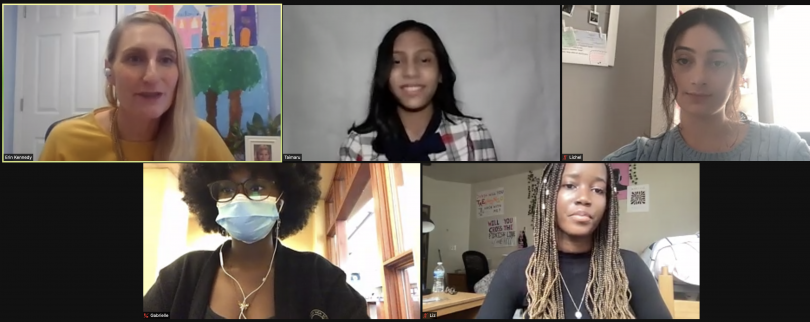Girls and adolescents from Latin America raised their voices to celebrate International Day of the Girl Child

On International Day of the Girl Child, girls from the LAC region participated in political advocacy spaces to tell their experiences, present on the issues that affect them and raise their voice for the recognition of their rights
Susan from Bolivia advocates to close the digital gap at Girls Speak Out event
Within the framework of the Girls Speak Out initiative, the UN Working Group on Girls, together with Canada, Peru and Turkey governments carried out the virtual event for Girls Speak Out: "Closing the digital divide to accelerate opportunities", of putting girls at the forefront to share their experiences, listen to what they need, and partner with them and key stakeholders to highlight sustainability and innovative solutions to the problems they are currently facing.
Susan, a 16-year-old Bolivian teenager and President of the Committee for children and adolescents in her municipality, was part of a panel of girls from all around of the world, government representatives and UN agencies
“I think we are overcoming obstacles, but we need the support of civil society organizations and governments to get more information, as well as training workshops to learn how to use technology and to include indigenous people in remote areas,” explains Susan.
“We have a long way to go, but we are committed to this path. The more people that can support our work, the better it will be to close this gap and so that we can have an equitable society."

Lead like a girl
A group of adolescents from the LAC region held a virtual dialogue which was also attended by Victoria Ward, Save the Children's Regional Director for Latin America and the Caribbean. This girls group have been related to political advocacy processes and are all leaders of their communities and girl’s rights activists. The dialogue sought the exchange of experiences, as well as to make visible the importance of the leadership of girls and adolescents in advocacy spaces. Also, promote that other girls can feel inspired and know their potential to make their voices heard louder.
Through this dialogue, they reflected on gender inequality and the various situations faced by girl leaders, such as mansplaining and other forms of sexism and gender violence. One of the most outstanding moments of the conversation was when each one of them mentioned the woman who inspired them, exchanging in this space part of their countries history and the achievement of their rights. Finally, recommendations were made to the authorities to continue working for girls' rights.
You can watch the full live session here.

Tamairu, an adolescent girl from Venezuela, brings inputs to the Girls Lead Act Initiative
Tamairu is a sixteen-year-old Venezuelan teenager. This week she had the opportunity to participate in the Girls Lead Act Event organized by Save the Children US. The event revolved around increasing girls' leadership globally and highlighting the importance of the Girls Lead Act; a US foreign assistance bill that seeks to highlight the leadership potential of girls and aims to increase the civic participation of girls around the world.
Tamaru shared the panel with activist girls from the United States and Indonesia, and US congresspeople, and took the floor to highlight girls' participation in decision-making spaces. Tamairu stated that in her community housework takes up most of the day. This, added to the lack of technology, has impacted girls' school attendance. She highlighted the need for a gender approach and called for the voices of girls to be heard in decision-making.
“I am interested in topics such as feminism and gender equality. But above all that girls can have equal opportunities for participation. For example, to carry out extracurricular activities, of which we must deprive ourselves (in many cases), just because we are girls, in many cases, they sign household tasks to us, and this limits our opportunities to participate in spaces like this".
“During the pandemic, child participation groups have been that, an opportunity for us to be heard and taken into account since they are inclusive and it is an incredible experience that accompanied me throughout this process of growth and to generate changes for achieving gender equality”.





